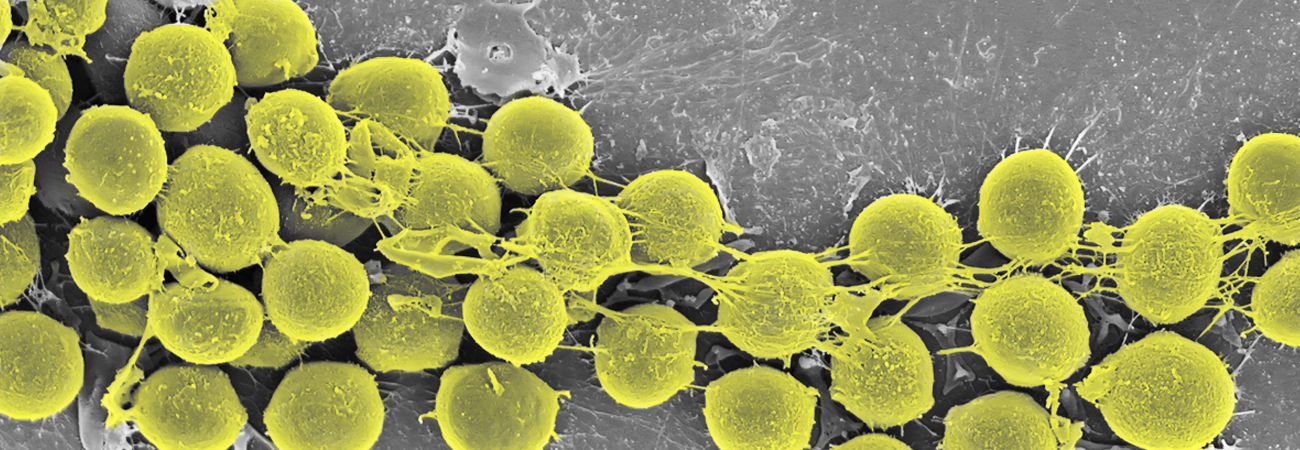

We study the Staphylococci, a broad genus of Gram-positive cocci that includes the well known pathogen Staphylococcus aureus and commensal bacteria often referred to as coagulase-negative Staphylococci. S. aureus is one of the most frequent causes of bacterial infections and in particular it is the dominant cause of skin infections. Antibiotic resistance levels, such as methicillin-resistant S. aureus (MRSA), have continued to rise limiting available treatment options and leading to worse patient outcomes. Our research focuses on discovering and understanding the processes that contribute to virulence in the hopes of developing new treatment strategies.
We are interested in investigating polymicrobial interactions between S. aureus and other commonly associated bacteria during both infection and colonization. In collaboration with several laboratories, we investigate the role of commensal organisms in S. aureus skin colonization and disease development. We are specifically interested in understanding how interactions between coagulase-negative staphylococci and S. aureus contribute to colonization resistance. We are also interested in polymicrobial interactions between S. aureus and gram-negative pathogens and their impact on pathogenesis and disease outcomes. In collaboration with the Schurr Lab, we are currently investigating how interactions with P. aeruginosa contribute to S. aureus increased virulence, persistence, biofilm formation, and antimicrobial resistance.
Bacterial colonization of the skin is an area of host-microbe interactions that warrants further investigation, as understanding this aspect is crucial for preventing Staphylococcus aureus skin infections. Our research in the Horswill lab employs genetic and biochemical methods to uncover the roles played by extracellular proteins, novel virulence and colonization factors, and skin metabolites in S. aureus skin colonization. We're also exploring interactions between S. aureus and other coagulase-negative Staphylococci in this context. Collaborating with diverse research groups, our aim is to mechanistically elucidate the factors facilitating S. aureus colonization and its progression to infection.
In the past decade our lab has focused on understanding the genetic and biochemical properties that drive the S. aureus biofilm lifecycle. This includes an extensive foundation of work uncovering various properties of the Agr quorum sensing pathway, its effectors, as well as associated two component systems. In a long-standing collaboration with the Center for Staphylococcal research at the University of Nebraska, we continue our efforts in understanding the matrix composition of biofilms. This includes efforts to define the host- pathogen interfaces formed during S. aureus biofilm infections. We are also beginning to ask fundamental questions about the inter-bacterial interactions that are particularly relevant to S. aureus biofilm infections such as those commonly made with Pseudomonas aeruginosa and Staphylococcus epidermidis.
Coagulase-negative staphylococci (CoNS) are the dominant human skin colonizers and make significant contributions to skin maintenance and health. CoNS serve as a rich source of versatile bioactive compounds, including metallophores, bacteriocins, and signaling-interfering autoinducing peptides (AIPs), which may play a pivotal role in shaping the skin community structure. Our primary interest lies in understanding the molecular basis of these natural products that govern interactions within the microbiome involving Staphylococcal pathogens and commensals. Through a combination of complementary approaches, including next-generation sequencing, molecular genetics, in vivo skin colonization models, and analytical biochemistry, we are actively engaged in the identification and characterization of novel antimicrobial compounds produced by Staphylococcus. Our ultimate goal is to reveal their potential therapeutic applications and elucidate their mechanisms of action.

Office: (303) 724-3534 | Research Complex 1 North, Rm. P18-9101
We are always looking for qualified applicants to do exciting bacteriology research in the mountains!